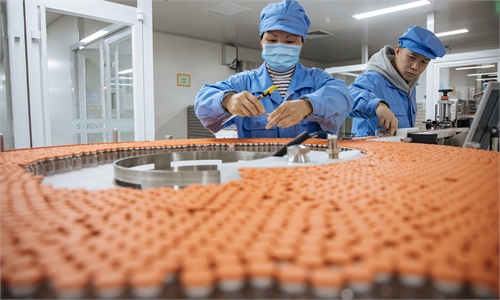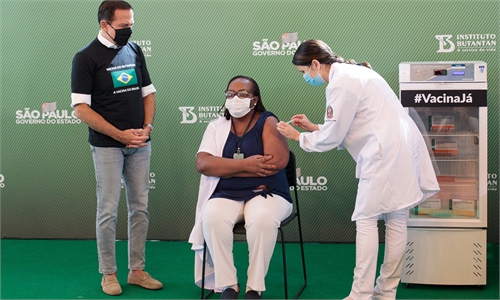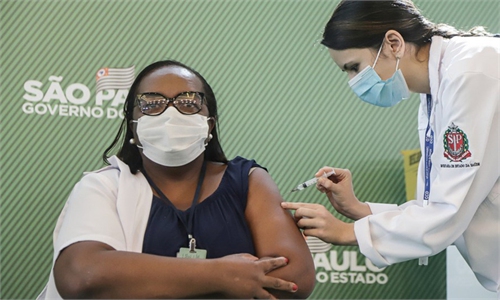IN-DEPTH / DIPLOMATIC CHANNEL
Brazil trusts Chinese-made vaccine; hopes stronger ties unaffected by US political sphere: Ambassador
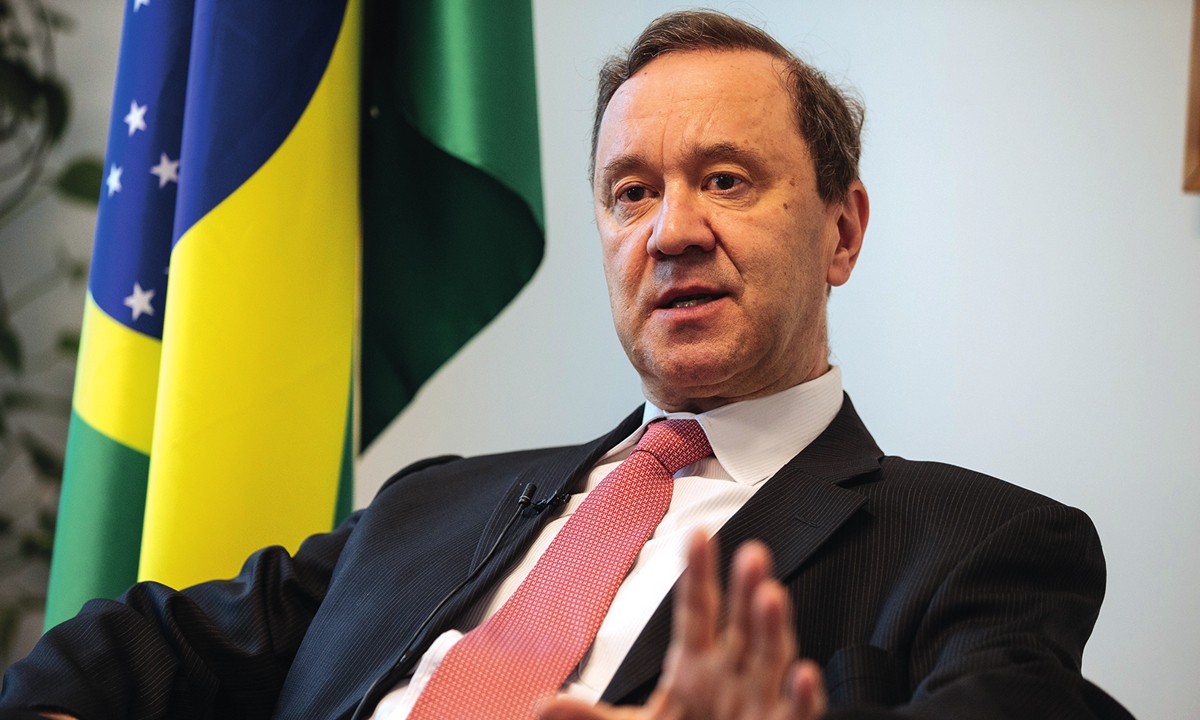
Ambassador Paulo Estivallet de Mesquita Photo: Li Hao/GT
Mutual beneficial in vaccine cooperation
GT: Brazil has been one of the earliest countries to approve the use of China's inactivated vaccine provided by Sinovac, after its large-scaled phase three trials co-conducted in Brazil. What impressed you most about the vaccine cooperation between the two countries?
Estivallet: Cooperation in vaccines between Brazil and China has been one of the most prominent features against the COVID-19 crisis. The vaccination campaign in Brazil, which is one of the largest in the world, has mostly relied until this point on Chinese vaccine. So we're very happy with that.
We hope that in the near future, we will be able to even increase this cooperation in terms of obtaining more doses, and strengthen the relationship between our institutions, because we have well-established health institutions in Brazil. They already had a traditional relationship with China, but it has reached a new level with the COVID-19 vaccines.
GT: Is Brazil interested in becoming a "vaccine center" for neighboring countries with the support of China?
Estivallet: We have the expectation that by the end of this year we will already have more than enough vaccines to vaccinate the whole Brazilian population through both domestic production and overseas imports including from China.
Thanks to the cooperation with China, we have been able to kick start the vaccination program in Brazil.
Currently, we do not have an export capacity for COVID-19 vaccines. There is, however, huge demand. We are working to develop the manufacturing capacity to supply not only our country, but also to support other countries that need the vaccines to respond to this crisis.
GT: Late-stage clinical trials of the vaccine co-developed by China's Sinovac and Brazil's state-owned Butantan institute have been in an unprecedented scale within such a short term. How do you think we can learn from each other from this remarkable cooperation?
Estivallet: Brazil has a long history of vaccination and vaccine development, at least since the second decade of the 20th century, so we have a lot of experience in clinical trials for vaccine development. When it comes to coronaviruses, however, we have had fewer epidemics than Asia, so cooperation with China is very important. We view such cooperation as something in which both sides learn from each other. The amount of resources invested in research for a COVID-19 vaccine has been very large, and there are now some new technologies that may also be used in the future to develop vaccines against other diseases, including those that are more prevalent in tropical areas. We hope that we will be able to learn from technology development that has happened in China and also work together in the future to develop new vaccines.
In any case, we are very satisfied with our scientific cooperation with China and we are determined to increase it in the future.
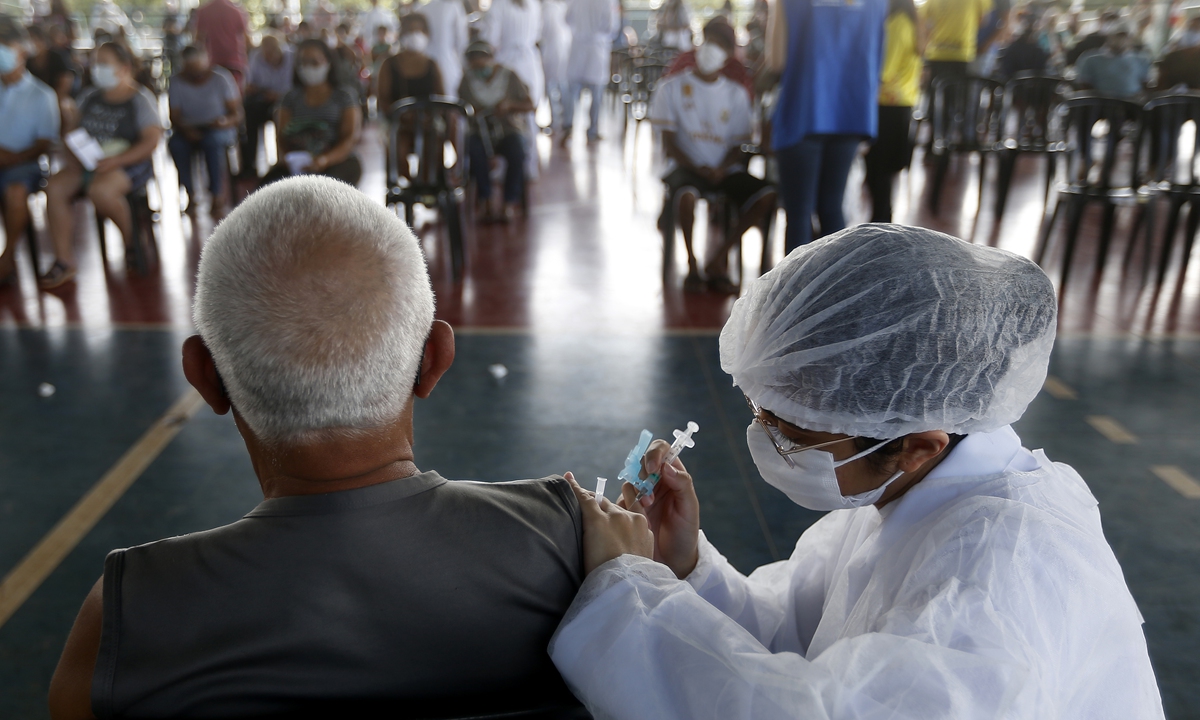
A man receives China-made COVID-19 vaccine in Brasilia, Brazil. Photo: Xinhua
GT: Though many Brazilians have shown their trust in Chinese-made vaccines, some media keep questioning its safety and efficacy. Is that something that makes you concerned?
Estivallet: There are anti-vaccine movements in many countries, including developed countries. There are doubts about many vaccines, not only Chinese ones. I think that is natural. And it is the role of the health authorities to convince people about the vaccines.
Right now, our problem is the lack of vaccines, not concerns about them. Once production increases over the next few months and supply hopefully exceeds demand, we may have to convince some people about the need to take the vaccine. In general, however, I am quite optimistic about Brazilian's attitude toward vaccines, including the Chinese vaccine.
GT: Why did you choose to work with China in the inactivated technology in developing vaccines at the very beginning other than other partners?
Estivallet: Perhaps because the inactivated virus technology is well-known and there was an expectation that it is more likely to be successful. In addition to that, traditional vaccines may be more easily accepted by people. We are also, however, looking carefully at the new technologies, especially now that some new vaccines have achieved very good results.
Some Chinese companies developing other types of COVID-19 vaccines are also reportedly planning to launch clinical trials in Brazil. The embassy is ready to help them in their contacts with potential Brazilian partners. In Brazil we often prefer to engage with pharmaceutical companies that are willing to transfer or to jointly develop technology.
With regards to mRNA technology, I see a huge potential. We are very interested in working with partners from other countries, including from China, to develop this technology.
GT:Some politicians and media have criticized China for engaging in "vaccine diplomacy" globally by attempting to use vaccines to enhance its global power. How do you respond to such claims?
Estivallet: I don't know exactly what is meant by vaccine diplomacy. We prefer to call it health diplomacy, and we are very happy with the health diplomacy that we have had with China. We have a relationship in which both countries have helped each other. We are strengthening our cooperation on health. We are forging closer ties between companies and research centers on health in both countries.
We are very happy with the cooperation that we have had with China on health issues over the last year. China's share of the Brazilian market for health products has increased significantly in the last year. This has now added another slab, another brick, to the building of our bilateral relationship.
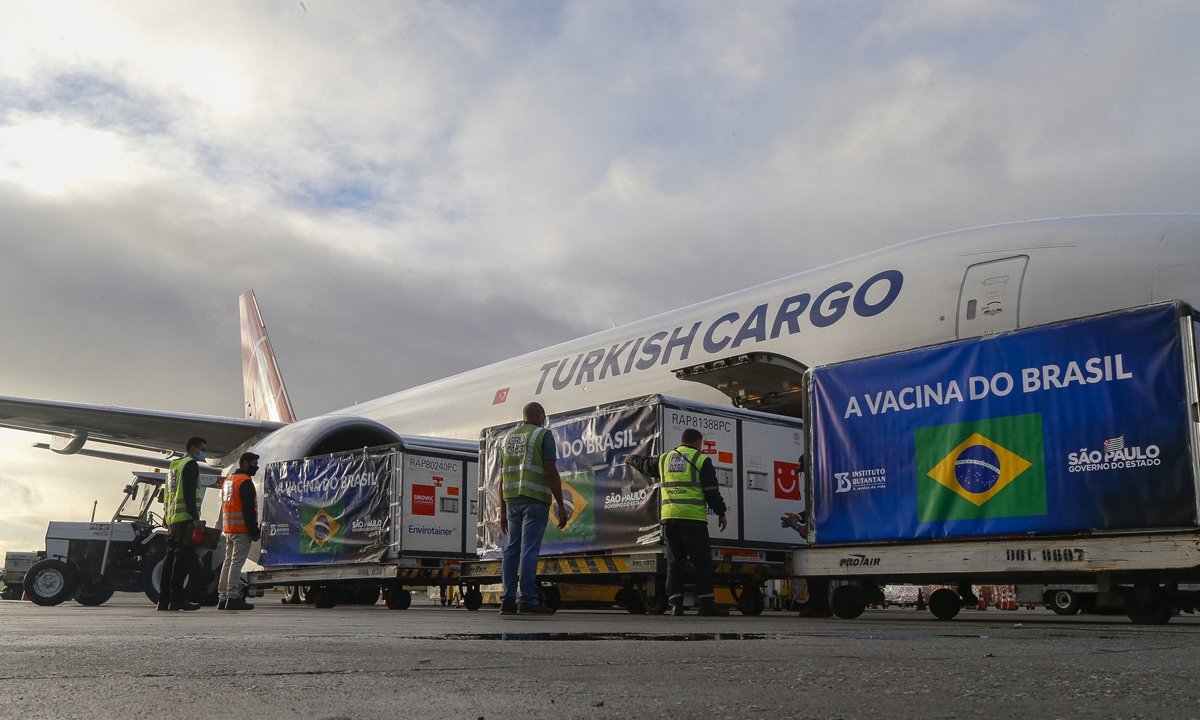
Containers carrying Active Pharmaceutical Ingredient (IFA) to manufacture COVID-19 vaccines developed by the Chinese laboratory Sinovac, are unloaded from a cargo plane at Guarulhos International Airport in Sao Paulo, Brazil, on April 19. Photo: AFP
A reliable partner in meat supply
GT: Have Brazil's soybean exports to China been affected by the COVID-19 pandemic and the China-US trade war?
Estivallet: The trade war affected temporarily some products on which China imposed surtaxes. Soybeans are one of them. Our soybean exports to China had an exceptional increase since 2017, partly due to these exceptional circumstances.
Though we do not think that it is in our benefit to have this kind of tension, Brazil has the capacity to increase its supply in ways that is helpful to China. China was able to reduce its imports from the US, because there were alternative suppliers, the largest of which was Brazil.
We hope for a return to the prevalence of multilateral trade rules. We have some concerns about a few elements in the phase one trade agreement signed between China and the US, depending on how the agreement is implemented. So far, we are not particularly concerned, but it is something that we follow closely to avoid discrimination against Brazilian exports.
GT: Have you talked with your US partners about your concern?
Estivallet: Yes, we have. This is the kind of conversation that we normally have about international trade developments. Brazil has always been a very strong supporter of multilateralism, and we think WTO provides a solid basis for normal operation under which everybody can benefit and trade can occur on stable and predictable conditions. We have also at times expressed our expectation to Chinese authorities that our products will not be discriminated in the Chinese market.
We all hope for a quick solution to current tensions. I think that both sides have their own reasons for the way they have been behaving, but Brazil believes it is in their interest, as well as that of the international community, that trade disputes should be resolved in accordance with multilateral rules and procedures.
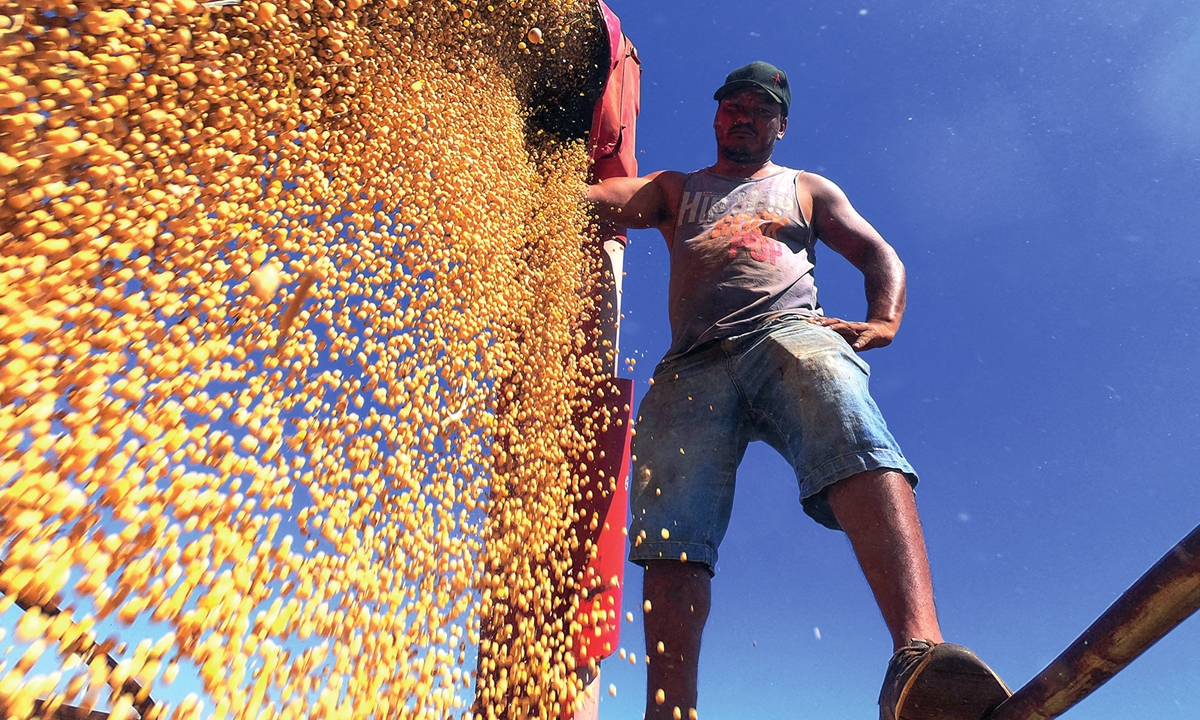
A worker scatters cropped soybeans in a truck in a field at Salto do Jacui, in Rio Grande do Sul, Brazil, on April 6. Photo: AFP
GT: Brazil is a major supplier of meat products to China, but the outbreak in Brazil has raised concerns among some Chinese consumers that infected workers in the meat industry might pose a risk to the products exported. What measures have Brazilian authorities adopted to strengthen safety checks for meat exports and other agricultural products?
Estivallet: Brazilian plants that export to China are of the highest quality. We have been complying with the highest, most rigorous standards required by Chinese authorities. We also have taken a number of sanitary measures since the very beginning of the pandemic in order to prevent any risk, however improbable it might be. The companies are applying rigid measures, such as periodically testing all the employees, ensuring social distancing in working areas, use of protecting equipment and constant sanitizing of surfaces, in order to prevent not only contagion among employees, but also that those with suspicion of infection enter the production facilities. There has been huge investments in controlling the pandemic within the plants, in order to ensure that the products that come to China are of the highest quality.
There have been instances where traces of genetic material have been found on packaging of products coming to China from all over the world. But it is important to highlight that no research so far has reported a single case of transmission through this way. Even if virus traces are found, they present no risk to consumers according to scientific research. In any case, I am happy to inform you that no trace of genetic material has been found on Brazilian products in recent months, even under the rigorous testing of all the imported meat carried out by Chinese Customs authorities. So Chinese consumers can be very confident about Brazilian supplies.
In the last year, Brazil's share of the Chinese import market has increased significantly, not only for beef and poultry, for which Brazil has been for years China's largest suppliers, but also for pork. I think this has been a great contribution also to China, because Brazil's ability to increase its supply of high quality food to China has helped keep prices down here. China knows that Brazil is a reliable partner when it has a supply shock.
Another difference that I am pleased to mention is that Brazilian cattle is mostly grassfed, which results in tastier and healthier beef than you might get from some other origins.
Strong China-Brazil relations in post-pandemic era
GT: How do you think China-Brazil relations will develop in post-pandemic era?
Estivallet: Our relations have been growing uninterruptedly for a long time. Even with the pandemic, our trade increased last year. One area that is relatively more recent, and which suffered last year, is the growing volume of investment. But we are confident that this will pick up again after the pandemic.
We also hope to develop other areas of bilateral cooperation that are yet not as strong as trade and investment. We are very keen on what the Chinese side calls people-to-people contacts. We hope that once the pandemic is over, we will be able to get resident students back in China and vice versa. We also hope to develop tourism between the two countries.
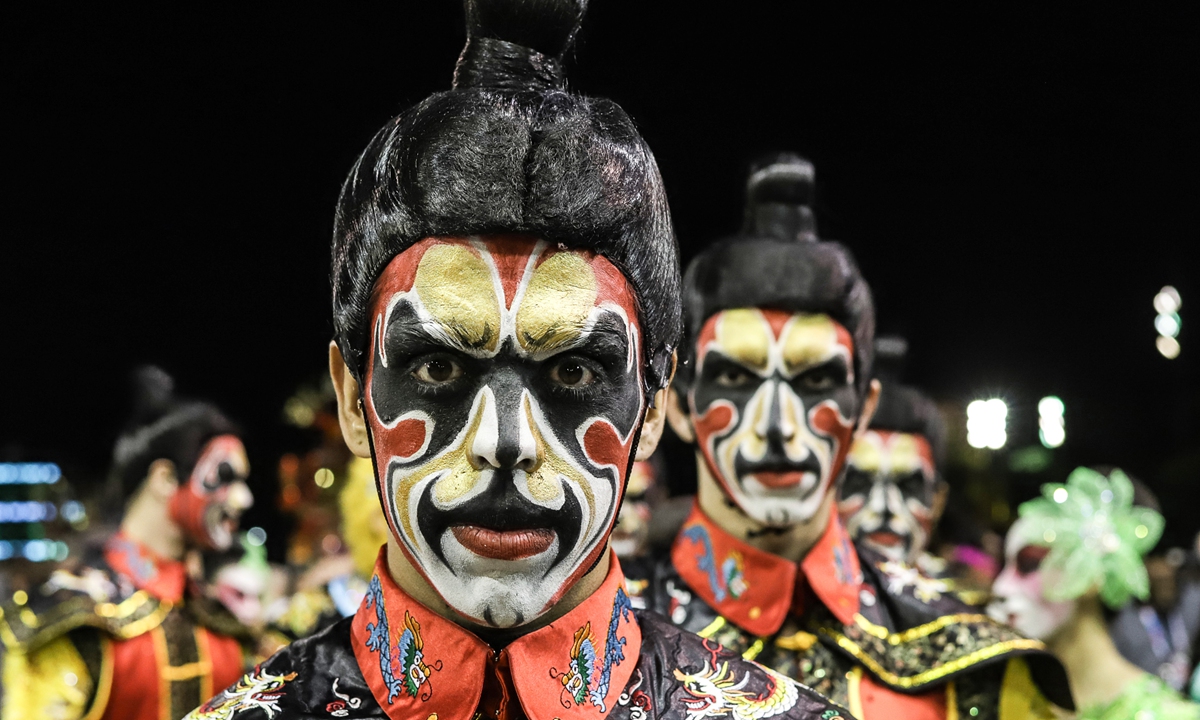
Men perform at a China-themed carnival in San Paolo, Brazil in February 2020. Photo: Xinhua
GT: Do you think the bilateral relations between China and Brazil will be affected by the new leadership in the US?
Estivallet: I think bilateral relations between Brazil and China are basically determined by the two countries. It's based on the interests of the two countries, which are forging a strong friendship that will continue to develop over the next few years. Of course, we all have to work with other countries, because the international system relies on everybody, but our bilateral relationship is in our hands.
Brazil does not feel that we have to pick sides. We want to have the best possible relationship with both countries. We don't see this as a zero sum game.
GT: Brazil is now still reeling from a COVID-19 surge. What more supports or cooperation do you desire from China in moving forward to fight the virus?
Estivallet: The most immediate demand at the highest level is that we need to speed up the rollout of vaccines in Brazil. We are already procuring a lot of vaccines from China. But we want to get more vaccines, more quickly. This is the first priority for us. We are satisfied with the willingness of the Chinese authorities to work with us. The conversations have been very productive and both sides have developed a fairly good understanding of each other's needs and priorities.
Over the medium term, we hope to strengthen even further the relationship between our health institutions and companies, so that we can look for mutually beneficial arrangements for the production of vaccines. Also we look forward to continue the cooperation that we have had at the scientific level on exchanges of best practices in COVID-19 treatments and on conducting the trials, so that we can all come out of this pandemic stronger.

